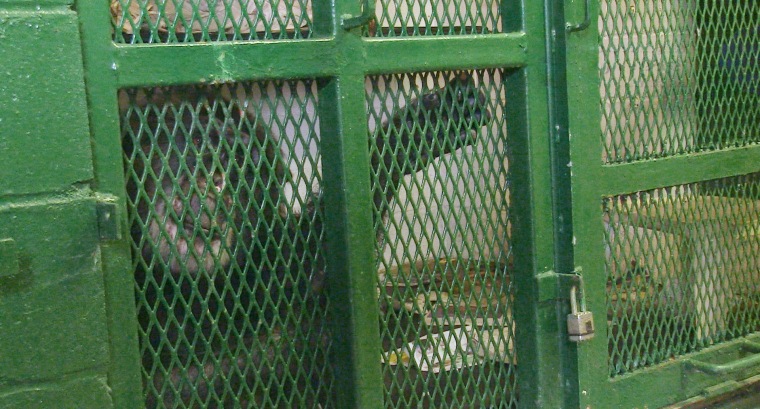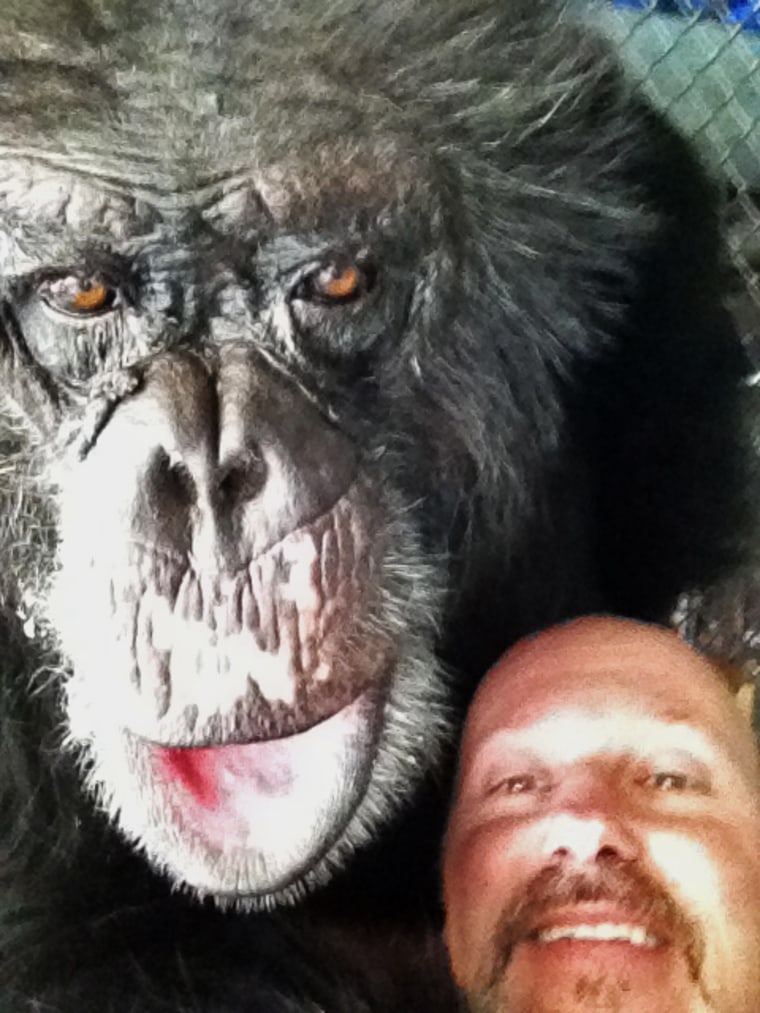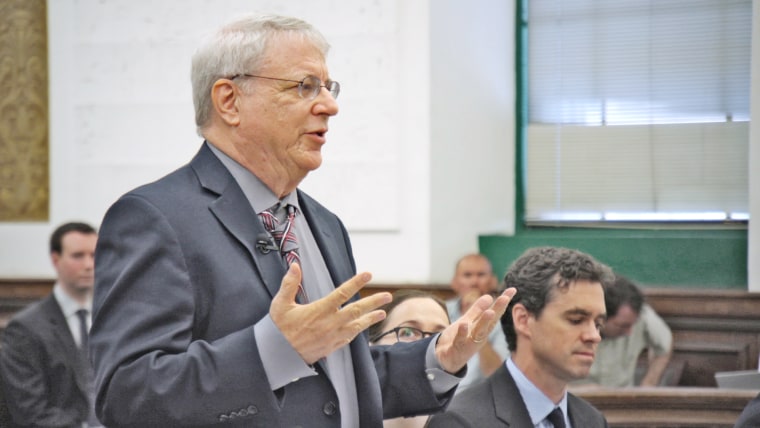When Steve Wise first started out as an animal rights lawyer, people used to bark at him when he entered a courtroom.
For more than 25 years, Wise has been arguing that animals who have cognitive complexities similar to humans should be legally endowed with basic rights of autonomy.
Now when he enters a courtroom, no one is barking.
On Thursday, Wise — who founded the Nonhuman Rights Project on behalf of the great apes, cetaceans and elephants — will go before the appellate division of the Supreme Court of the State of New York in Manhattan and argue that two of his clients, chimpanzees Kiko and Tommy, should be afforded the rights of "personhood."
"'Personhood' is not synonymous with 'humans.' It is not now and never has been," Wise told NBC News. "A 'person' is the law's way of saying that entity has the capacity for rights. A 'thing,' which chimpanzees are now, don’t have capacity for any kind of rights."
Wise is hoping to prove in the eyes of the court that chimpanzees and other great apes aren't "things" but rather are autonomous beings that possess consciousness and deserve to live their lives to the fullest possible extent of that autonomy.
Tommy and Kiko
Wise has been fighting on behalf of Tommy and Kiko since 2013.
Since then, Wise has been running to and from court with habeas corpus cases for both chimpanzees, and while judges often sympathize with their cause, they've ultimately reject their pleas.
Despite representing the primates for the better part of four years, checking on their condition is a frustrating subject for the staff at Nonhuman Rights Project.

“We see them as clients of ours, but we can’t get a jail house visit or help them exercise a Sixth Amendment right,” said Kevin Schneider, executive director of Nonhuman Right Project. “They’re things, so we can’t barge in and see what’s going on.”
Tommy, believed to be in his late 30s, is owned by Patrick Lavery. The chimpanzee lives in a cage of cement and green-painted steel behind Circle L Trailer Sales in Gloversville, New York, according to the Albany Times Union.
In 2013, Lavery told the Times Union that Tommy, although he was living without companionship, had enrichment in the form of television, cable and radio.
“To treat them as things destroys them,” Wise said. “The same way we would be destroyed in solitary confinement.”
In the 2016 HBO documentary "Unlocking the Cage," which documents Wise's fight to file habeas corpus petitions on behalf of chimpanzees in New York, Lavery is seen telling Wise he wants Tommy to be sent to a Florida farm because the ape is "lonely." Wise later argues that the Florida farm is not a suitable environment for Tommy.
Kiko, believed to be in his early 30s, is a former animal actor, who was beaten so badly by his trainers, he’s partially deaf, according to Nonhuman Rights Project.
The chimpanzee now lives in the Primate Sanctuary in Niagara Falls, New York, which is operated by Carmen and Christie Presti. Nonhuman Rights Project alleges the sanctuary is run out of the Presti’s home, and the animals aren’t in a natural environment.

"I can't believe Mr Wise is still trying to win this case! It has been thrown out of court 3 or 4 times," Carmen Presti told NBC News in an email. He said Wise's efforts would be better served fighting for chimpanzees in the wild or captivity, rather than arguing they deserve "personhood."
Presti said the Primate Sanctuary sent its USDA license, inspection records and Department of Environmental Conservation permit to court every time Wise has brought forward a case and each time the judge has ruled in the sanctuary's favor.
He added that if Wise "wins this case for chimps (WHICH HE WONT) next is the African Gray Parrots."
Lavery did not immediately respond to a request for comment made by NBC News.
A case about rights, not welfare
Although Wise and Schneider said the chimpanzees aren’t being kept in ideal conditions, they’re not alleging their owners have done anything wrong.
In fact, they said everything the Prestis and Lavery have done is entirely legal.
“We specifically say we are not alleging [the Prestis or Lavery] have violated any local, state or federal law,” Wise said. “What we’re saying is those laws are grossly insufficient and [the chimpanzees] should have right to bodily liberty. We’re not trying to protect their welfare, we’re trying to protect rights.”
Wise said the only reason chimpanzees and other great apes are able to be kept in cages is because they are legally deemed “things.” The last time Wise was in court in 2015 — arguing on behalf of chimpanzees Hercules and Leo, who were kept at Stony Brook University on Long Island for research — the state argued the animal’s classification should remain just that.
“The reality is these are fundamentally different species. I worry about the diminishment of these rights in some way if we expand them beyond human beings,” Christopher Coulston, an assistant New York state attorney general said.
Coulston told New York State Supreme Court Justice Barbara Jaffe, that even though “personhood” is sometimes attributed to corporations and ships, those entities are “in some way related to human interests.”
“Whether it’s a corporation, whether it’s a ship that is treated as a legal person, we think that is the principle that has governed the assignment of legal personhood,” Coulston argued.
But Wise said society has come a long way since the apes were first deemed “things” and more than half a decade of studying great apes has revealed a wealth of knowledge about their intelligence and awareness.
“The reason we chose [great apes, elephants and cetaceans] is there’s an extraordinary amount of scientific observation— more than half a century — that’s been done,” Wise said. “Articles reveal they are extremely cognitively complex, similarly to the way we're complex. “
Scientists on their side
Although Wise is facing an uphill battle in the courtroom on Thursday, he has some of the foremost experts behind him as he heads to Manhattan.
This includes Jane Goodall, considered the premier expert on chimpanzees after more than five decades studying them in Gombe Stream National Park in Tanzania.

Goodall, who sits on the board of Nonhuman Rights Project, filed a 27-page affidavit on behalf of the chimpanzees along with several other experts. Wise said the case currently has 160 pages of expert affidavits filed on behalf of the chimpanzees.
Related: No, Chimpanzees Aren’t ‘Legal Persons,’ New York Judge Rules
Jaffe ruled against Wise’s case for Hercules and Leo, saying that, while she sympathized with their cause, she was bound by a decision made by a different New York judge. An appellate division of the New York State Supreme Court known as the Third Department had concluded that the chimpanzees did not meet the requirement for "personhood" because the apes did not carry out duties and responsibilities in society.
Wise then enlisted Goodall to write an affidavit that would challenge that decision.
She said that in her 50 years of observation, chimpanzees demonstrated “well-defined” duties and responsibilities, listing how communities care for each other and are responsible to one another through a host of examples.
But Wise is also arguing that while chimpanzees do exhibit responsibilities, they also don’t need to have responsibilities to deserve rights.
“What we’re doing is arguing that the Third Department was wrong in at least six different ways and that you don’t need to have duties in society in order to be a person and have legal rights,” he said.
Small steps forward
The last time Wise went before a judge to argue the case of Kiko and Tommy, no chimpanzee in the world had ever been granted nonhuman rights.
But that won’t be the case on Thursday.
In November 2016, Judge María Alejandra Maurico of Argentina ruled that a chimpanzee named Cecilia was a “nonhuman legal person” and agreed that the ape had “inherent rights.”
Two years earlier, the same judge deemed an orangutan named Sandra also deserved "personhood."
Both apes were transferred to a sanctuary in Brazil to live as autonomously as possible with other animals in their species for the rest of their lives.
Wise and Schneider said they will be using Cecilia’s case as a tool to argue theirs and are hoping for a similar outcome.
“Assuming the court agrees [with us], we suggest [Kiko and Tommy] should be sent to Save the Chimps in Fort Pierce, Florida,” Wise said.
He said it’s at this 150-acre sanctuary the chimpanzees will be able to live out their lives to the maximum amount of autonomy possible for animals raised in captivity.
“We think [the court] is going to say, ‘You don’t need to have duties and responsibilities to not be enslaved,’ and remand that case to Justice Jaffe and say ‘Don’t look at Third Department’s decision; hold a hearing and decide the case,'” Wise said. “That’s what we think is more likely than other two extremes, but the court surprises us all the time. We’ve been wrong every time.”
